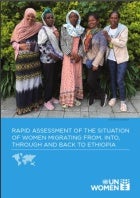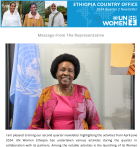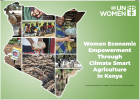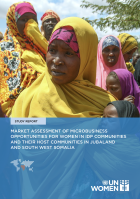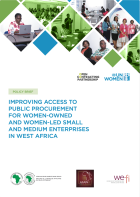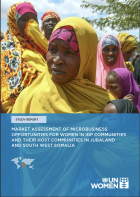1 - 18 of 18 Results
Date:
The rapid assessment provides an analysis of the situation of women migrating from, to through and back to Ethiopia based on existing literature and a review of relevant policies, legal frameworks and services related to migration governance in Ethiopia, with a gender lens. The assessment also proposes recommendations to strengthen the rights of migrant women at all stages of migration.
Date:
Drawing on the policy brief on advancing the rights of Ethiopian migrant women domestic workers the infographic illustrates the risk and realities facing Ethiopian women migrating for domestic work at all stages including pre-departure, during the journey, at country of destination and upon return and provides insights for action.
Date:
UN Women Ethiopia has undertaken various activities during the quarter in collaboration with its partners. Among the notable activities is the launching of its WomenEconomic Empowerment Strategy. The strategy encapsulates UN Women’s vision of empowering women to thrive and economies to prosper. It aims to dismantle the systemic barriers that prevent women from fully participating in the economy.
Another important work done during the quarter is the continuation of our effort to ensure the participation of Civil Society organizations in the transitional justice processes. To this end, a two-day national workshop on creating space for the CSOs to participate in the implementation process of transitional justice policy in Ethiopia was held in June 2024. The workshop targets women leaders from non-governmental and CSOs and representatives of grassroots community groups aimed to assess gender sensitivity of the Transitional Justice (TJ) Policy recently adopted by Ethiopia’s Council of Ministers.
Date:
The WEE-CSA Storybook showcases the success stories of over 2,400 women from Kitui, Laikipia, and West Pokot who have transformed their lives through climate-smart agriculture. Funded by KOICA and implemented by UN Women Kenya, it highlights the project's impact on livelihoods and gender equality while sharing valuable lessons learned. This collection celebrates resilience and aims to inspire further community upliftment for sustainable development in Kenya.
Date:
Accessing accurate information on and services for regular migration is not easy; Ethiopian women may rely instead on informal networks and unregistered recruitment agencies. Ethiopian migrant women travelling via irregular overland routes, as opposed to travelling by plane, face high risks of sexual and gender-based violence, including trafficking for forced labour and sexual exploitation. Upon reaching their destination countries and taking up domestic work, they often face abusive and exploitative situations. Health issues, including physical injuries and high rates of suicide, are widespread among Ethiopian migrant women domestic workers. Despite these harsh realities, some women secure relatively high salaries in comparison to those in Ethiopia and send significant portions of their salaries home to support their families. Upon returning to Ethiopia, many women face stigma, limited economic opportunities and psychological distress. Limited gender-responsive reintegration support further complicates their efforts to rebuild their lives and attain economic independence.
Date:
This brief emerges from the Assessment of National Responses and Strategies on Trafficking in Persons and Migration, with a specific focus on the vulnerabilities of women and girls to all forms of exploitation.
Date:
The factsheet provides a brief overview of the Making Migration Safe for Women programme implementation focus, activities and stakeholders involved.
Date:
The publication aims to understand the current landscape of microbusiness in terms of the opportunities, barriers and challenges that women in displacement settings face in accessing economic opportunities in the cities of Kismayo, Dollow and Baidoa
Date:
Women own 30 per cent of the small and medium businesses worldwide, yet women-owned businesses only access 1 per cent of all procurement contracts suggesting systemic gender disparities within procurement systems. This policy brief analyses the extent to and ways in which regional institutions in West Africa could adopt better policies for gender-responsive procurement.
Date:
The policy brief aims to serve as an synthesizes and presents key findings from UN Women-led research; regional online surveys and; advocacy on. making the AfCFTA work for (young) women and (young) women-led businesses, both in the design and implementation of gender-responsive AfCFTA policy reforms and complementary measures, as well as in the soon-to-be negotiated AfCFTA Protocol on Women and Youth in Trade.
Date:
Empowering women in the economy and closing gender gaps in the workspace is key to achieving the 2030 Agenda for Sustainable Development and achieving the Sustainable Development Goals in Somalia. The host community landowners and IDP casual laborers can jointly build their skills in climate-smart agriculture that can benefit the productivity of farms whilst also building the knowledge and skill set of IDPs.
Date:
This factsheet offers some insights into migrant women’s experiences in Niger, based on the limited data that is available on this topic. It was prouced as part of the Making Migration Safe for Women programme which aims to ensure that migration is safe for women migrating from, into and through Niger and that international norms and standards for protecting and promoting migrant women’s rights are strengthened. Read/Download : EN
Date:
This two-pager provides an overview of the Making Migration Safe for Women (MMS) program in Niger. The overarching goal of the program is to ensuring that migration is safe for women migrating from, into and through Niger and that international norms and standards for protecting and promoting migrant women’s rights are strengthened. The program will support the Nigerien government in strengthening its migration policies, laws and services to ensure they are gender-responsive, as well as...
Date:
The African Continental Free Trade Area (AfCFTA) an opportunity for growth and prosperity in Africa. However, because of pre-existing inequalities in African economies, the agreement’s benefits will not be distributed equally along gender lines. As the AfCFTA Secretariat is starting to draft a Women in Trade Protocol, it is important that women across the continent participate actively in the process to voice their views, interests, and needs. This advocacy brief highlights 9 important...
Date:
This Rapid Assessment, the first of its kind in Niger, aims to highlight the challenges that women may face migrating from, into and through the country. It has been developed based on a desk review of existing literature as well as information received from questionnaires completed by relevant governmental and non-governmental organizations and interviews with UN agencies and other development partners. However, the availability of comprehensive sex-disaggregated data in Niger is limited. As...
Date:
The rapid assessment publication on Gender and Agricultural Mechanization in Ethiopia provides clear recommendations to inform the agricultural mechanization policy currently under development in the country by adding value to the process through introduction of gender responsiveness approach. The assessment also aims to strengthen enforcement of the existing agricultural mechanization by evaluating current practices in gender and mechanization in the...
Date:
UN Women East and Southern Africa continues to STEP IT UP for gender equality on a daily basis to give voice to women and girls who are still challenged with the violence, injustice, unequal opportunities and prejudices because of their gender.
Date:
In this issue : -Introduction: the gender gap in agricultural productivity -Three takeaways on the gender gap in agricultural productivity -Measuring the cost of the gender gap in agricultural productivity -Costing the factors that contribute to the gender gap in agricultural productivity -Finding the biggest bang for the buck: cost-effective policy interventions -Moving from recommendations to implementation -Appendix A: Methodology for quantifying the cost of the gender gap in...

